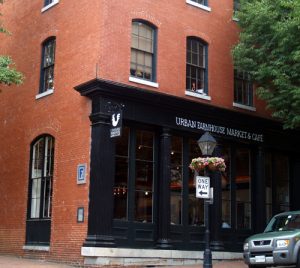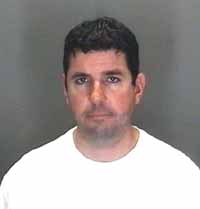 Union First Market Bank has foreclosed on a portfolio of properties owned by developer Justin French.
Union First Market Bank has foreclosed on a portfolio of properties owned by developer Justin French.
The Richmond-based bank lent more than $17 million on the seven properties, which are to be auctioned off Dec. 10 outside the John Marshall courthouse.
The foreclosure also puts in jeopardy an unspecified amount of federal tax credits awarded to the Markel Corporation, French’s investor in all but one of the projects.
The properties include an apartment building in Scott’s Addition, a commercial building in Shockoe Slip and the historic A.D. Price Funeral Home in Jackson Ward.
Union First Market President David Fairchild would not comment on the foreclosures when reached yesterday.
In July, Union First Market filed suit against the ownership entities of each property to place them under receivership, which would allow a court-approved receiver to collect rents and manage the properties on behalf of the bank. The motion was granted, and six of the seven properties were placed under the receivership
of Stephen Brincefield from Thalhimer’s property management division. (You can read more about that in an RBS story here).
 The loans were all guaranteed by French, who claims he defaulted on purpose on as part of a feud between him and Markel.
The loans were all guaranteed by French, who claims he defaulted on purpose on as part of a feud between him and Markel.
French is facing nine felony counts for fraud and is scheduled to reappear in Richmond District Court in January. An investigation by the FBI and IRS is ongoing.
The latest foreclosures could end up invalidating tax credits Markel has received from French’s projects.
Federal historic tax credits, which are awarded in the amount of 20 percent of a project’s cost, are subject to recapture if the property changes owners within a five-year period, according to federal law. (Read more about rules for the federal program here. )
The amount recaptured is on a prorated basis, so if the project is transferred within the first year, 100 percent of the credit is lost. If the project changes hands after five years, only 20 percent of the credit is recaptured.
A freeze has been placed on historic tax credit documents pertaining to French’s properties because of the investigation by the FBI and IRS, so the exact amount Markel stands to lose could not be verified.
Representatives of Markel did not respond to several calls seeking comment.
In June, French shared an email with BizSense that he had sent to officials at the bank in which he stated the following:
“Regrettably for Markel, this transfer of ownership will create a recapture of all the Federal credits on every project Markel contractually controls with me. It will invalidate all of the $1.8 million in credits I just delivered. It will invalidate $400,000 in credits that are imminently being delivered. It will invalidate $700,000 in credits being completed for submission.”
As for the state tax credits awarded on the projects, which are equal to 25 percent of the project’s cost, those will be safe. At least for now.
“The state does not have a requirement as far as retaining ownership,” said Elizabeth Tune, incentive manager for the Department of Historic Resources.
State regulations do allow for recapture within a three-year period if it is discovered that the applicant falsified information submitted to DHR.
The foreclosed properties in question are:
1509 Bellville St.
1610 Altamont Ave.
212 East Leigh St.
207-211 E. Main St.
2906 W. Clay St.
3122 Clay St.
1211-1217 E. Cary St.
The A.D. Price Funeral Home at 212 E. Leigh St. does not have any tax credits tied to it. French had bought it out of another foreclosure from First Market Bank (which later merged with Union Bank & Trust to form Union First Market) in 2009. It was slated for renovation into apartments.
The bank’s decision to foreclose on the properties comes as a surprise to at least one tenant. Kathleen Richardson, owner of the Urban Farmhouse Market and Cafe at 1217 E. Cary St., said she was not aware that the foreclosure was taking place.
“I assume someone will come in and buy it and there will be a new landlord for a while,” Richardson said. “If I had the funds I’d come in and by it myself.”
 Union First Market Bank has foreclosed on a portfolio of properties owned by developer Justin French.
Union First Market Bank has foreclosed on a portfolio of properties owned by developer Justin French.
The Richmond-based bank lent more than $17 million on the seven properties, which are to be auctioned off Dec. 10 outside the John Marshall courthouse.
The foreclosure also puts in jeopardy an unspecified amount of federal tax credits awarded to the Markel Corporation, French’s investor in all but one of the projects.
The properties include an apartment building in Scott’s Addition, a commercial building in Shockoe Slip and the historic A.D. Price Funeral Home in Jackson Ward.
Union First Market President David Fairchild would not comment on the foreclosures when reached yesterday.
In July, Union First Market filed suit against the ownership entities of each property to place them under receivership, which would allow a court-approved receiver to collect rents and manage the properties on behalf of the bank. The motion was granted, and six of the seven properties were placed under the receivership
of Stephen Brincefield from Thalhimer’s property management division. (You can read more about that in an RBS story here).
 The loans were all guaranteed by French, who claims he defaulted on purpose on as part of a feud between him and Markel.
The loans were all guaranteed by French, who claims he defaulted on purpose on as part of a feud between him and Markel.
French is facing nine felony counts for fraud and is scheduled to reappear in Richmond District Court in January. An investigation by the FBI and IRS is ongoing.
The latest foreclosures could end up invalidating tax credits Markel has received from French’s projects.
Federal historic tax credits, which are awarded in the amount of 20 percent of a project’s cost, are subject to recapture if the property changes owners within a five-year period, according to federal law. (Read more about rules for the federal program here. )
The amount recaptured is on a prorated basis, so if the project is transferred within the first year, 100 percent of the credit is lost. If the project changes hands after five years, only 20 percent of the credit is recaptured.
A freeze has been placed on historic tax credit documents pertaining to French’s properties because of the investigation by the FBI and IRS, so the exact amount Markel stands to lose could not be verified.
Representatives of Markel did not respond to several calls seeking comment.
In June, French shared an email with BizSense that he had sent to officials at the bank in which he stated the following:
“Regrettably for Markel, this transfer of ownership will create a recapture of all the Federal credits on every project Markel contractually controls with me. It will invalidate all of the $1.8 million in credits I just delivered. It will invalidate $400,000 in credits that are imminently being delivered. It will invalidate $700,000 in credits being completed for submission.”
As for the state tax credits awarded on the projects, which are equal to 25 percent of the project’s cost, those will be safe. At least for now.
“The state does not have a requirement as far as retaining ownership,” said Elizabeth Tune, incentive manager for the Department of Historic Resources.
State regulations do allow for recapture within a three-year period if it is discovered that the applicant falsified information submitted to DHR.
The foreclosed properties in question are:
1509 Bellville St.
1610 Altamont Ave.
212 East Leigh St.
207-211 E. Main St.
2906 W. Clay St.
3122 Clay St.
1211-1217 E. Cary St.
The A.D. Price Funeral Home at 212 E. Leigh St. does not have any tax credits tied to it. French had bought it out of another foreclosure from First Market Bank (which later merged with Union Bank & Trust to form Union First Market) in 2009. It was slated for renovation into apartments.
The bank’s decision to foreclose on the properties comes as a surprise to at least one tenant. Kathleen Richardson, owner of the Urban Farmhouse Market and Cafe at 1217 E. Cary St., said she was not aware that the foreclosure was taking place.
“I assume someone will come in and buy it and there will be a new landlord for a while,” Richardson said. “If I had the funds I’d come in and by it myself.”
Question: If the investors bought the notes, not the properties, would that avert the change in ownership and preserve the tax credits?
Wouldn’t the notes be more valuable with the tax credits than as defunct projects?
Would the banks consider this?
Linda Heath
President
Financial Holographix, Inc.
Kathleen, I hope your resturant stays a float. I personally will lose 15k from this, my company installed the plumbing and equipment in your place that I have not been paid for. French has stiffed me for the last payment, and most likely will be forced to painfully absorb this. Its ashamed that the honest guy or gal and their family tends to finish last in business, but I wish you the very best in your situation.
Ed , Plumber On The Way